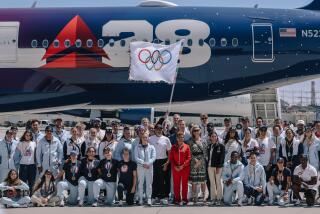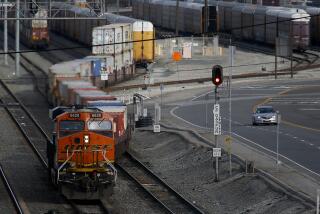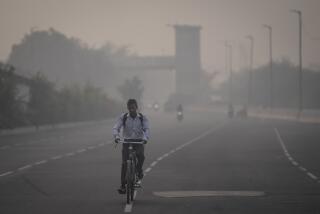Beijing Focuses on Cleaning Up the Air for Its Olympic Moment
- Share via
BEIJING — With the start of the 2008 Olympics exactly two years away, the Chinese government is increasingly focusing on the one thing most likely to spoil its best-laid plans for smooth Games: the sky.
Having changed the opening date to Aug. 8 to avoid starting the Games during the rainy season, officials have been pressing to clean the air athletes will breathe, in a nation that is the world’s biggest producer of sulfur dioxide.
On Tuesday, organizers updating the public about preparations for the Olympics said they were confident the city would meet an ambitious goal of having acceptable air quality for 65% of the year, meaning measurements would reach an international standard of “moderate” or better.
The goal appeared out of reach after severe sandstorms in the spring, but an unusually rainy July helped clear the air.
Critics worry that China’s obsession with the so-called blue-sky rating and dry weather is masking deeper problems.
“It’s meaningless propaganda to fool the people into thinking things are getting better,” said Wen Bo, Beijing representative for the California-based Pacific Environment.
By the government’s own admission, much of China’s environmental problems come from the country’s relentless economic growth. The Olympics themselves have contributed to a massive building boom. Beijing has more than 9,000 construction sites, including 12 competition venues, four subway lines and a new airport -- not to mention hotels and other real estate developments related to the Olympic fever.
Coal remains China’s main source of energy, and the chief contributor to the 25 million tons of sulfur dioxide China emitted in 2005 -- a 27% jump from 2000, according to government figures. The toxic gas, a major cause of breathing problems and acid rain, cost the country $60 billion in damage to buildings, crops, vegetation and human health, according to Chinese environmental officials, who announced the figures last week.
Another contributor to Beijing’s notoriously hazy skies is rising car ownership. Along with China’s improved living standards has come a newfound love for the automobile. Authorities have pledged to phase out 28,000 outdated cars and buses from Beijing’s roadways. But an estimated 2.5 million cars roam the Chinese capital’s regularly congested streets, and that number is believed to be shooting up by about 10% a year.
The problem is so acute that there is discussion of banning private vehicular traffic during the Games, and giving the entire city of 15 million a holiday.
“These are emergency measures that would bring temporary relief,” said Yang Ailun, climate and energy campaign manager for Greenpeace based in Beijing. “What we need are long-term solutions that address the future of China’s environment.”
In the meantime, organizers are confident that rain won’t spoil the opening ceremonies.
“We have studied the historic data of weather conditions on Aug. 8 in the past 50, 30 and 10 years,” said Wang Wei, the executive vice president of the Beijing Organizing Committee for the Olympic Games. “On most of those dates there was no rainfall or very little rainfall.”
Eight also is a number associated with profit in Chinese culture, and organizers clearly hope they will reap some when the Games begin on the eighth day of the eighth month of the eighth year of the century.
More to Read
Go beyond the scoreboard
Get the latest on L.A.'s teams in the daily Sports Report newsletter.
You may occasionally receive promotional content from the Los Angeles Times.






